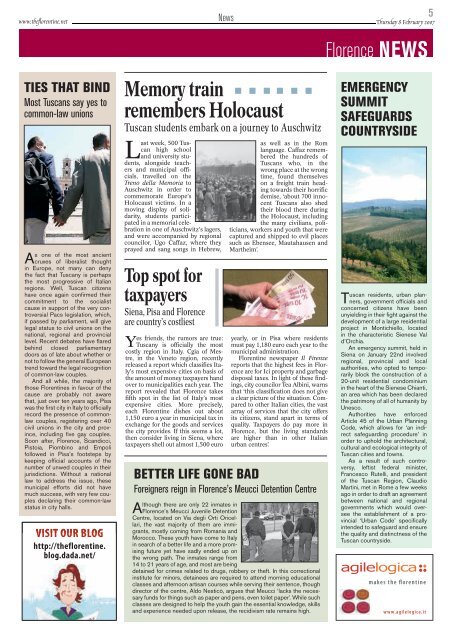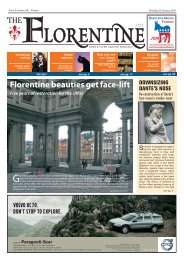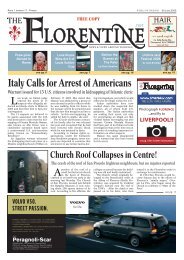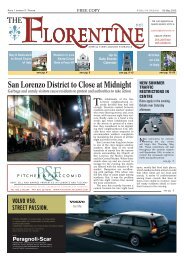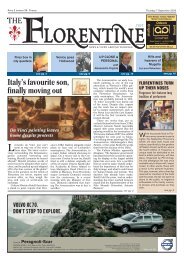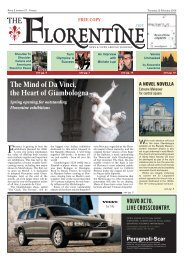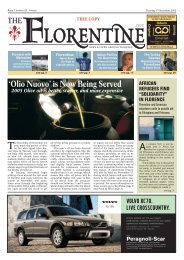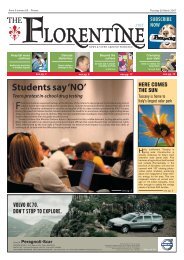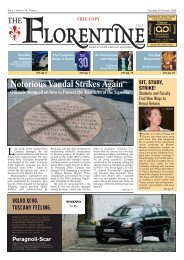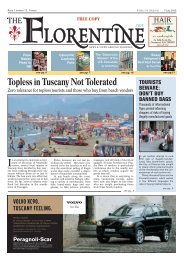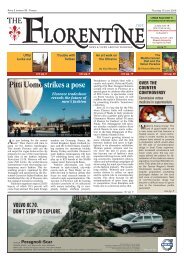Without the Arno, Florence would be like Romolo - The Florentine
Without the Arno, Florence would be like Romolo - The Florentine
Without the Arno, Florence would be like Romolo - The Florentine
Create successful ePaper yourself
Turn your PDF publications into a flip-book with our unique Google optimized e-Paper software.
www.<strong>the</strong>fl orentine.net<br />
TIES THAT BIND<br />
Most Tuscans say yes to<br />
common-law unions<br />
As one of <strong>the</strong> most ancient<br />
cruxes of li<strong>be</strong>ralist thought<br />
in Europe, not many can deny<br />
<strong>the</strong> fact that Tuscany is perhaps<br />
<strong>the</strong> most progressive of Italian<br />
regions. Well, Tuscan citizens<br />
have once again confi rmed <strong>the</strong>ir<br />
commitment to <strong>the</strong> socialist<br />
cause in support of <strong>the</strong> very controversial<br />
Pacs legislation, which,<br />
if passed by parliament, will give<br />
legal status to civil unions on <strong>the</strong><br />
national, regional and provincial<br />
level. Recent debates have fl ared<br />
<strong>be</strong>hind closed parliamentary<br />
doors as of late about whe<strong>the</strong>r or<br />
not to follow <strong>the</strong> general European<br />
trend toward <strong>the</strong> legal recognition<br />
of common-law couples.<br />
And all while, <strong>the</strong> majority of<br />
those <strong>Florentine</strong>s in favour of <strong>the</strong><br />
cause are probably not aware<br />
that, just over ten years ago, Pisa<br />
was <strong>the</strong> fi rst city in Italy to offi cially<br />
record <strong>the</strong> presence of commonlaw<br />
couples, registering over 40<br />
civil unions in <strong>the</strong> city and province,<br />
including fi ve gay couples.<br />
Soon after, <strong>Florence</strong>, Scandicci,<br />
Pistoia, Piombino and Empoli<br />
followed in Pisa’s footsteps by<br />
keeping offi cial accounts of <strong>the</strong><br />
num<strong>be</strong>r of unwed couples in <strong>the</strong>ir<br />
jurisdictions. <strong>Without</strong> a national<br />
law to address <strong>the</strong> issue, <strong>the</strong>se<br />
municipal efforts did not have<br />
much success, with very few couples<br />
declaring <strong>the</strong>ir common-law<br />
status in city halls.<br />
VISIT OUR BLOG<br />
http://<strong>the</strong>florentine.<br />
blog.dada.net/<br />
News<br />
Memory train<br />
remem<strong>be</strong>rs Holocaust<br />
Tuscan students embark on a journey to Auschwitz<br />
Last week, 500 Tuscan<br />
high school<br />
and university students,<br />
alongside teachers<br />
and municipal offi -<br />
cials, travelled on <strong>the</strong><br />
Treno della Memoria to<br />
Auschwitz in order to<br />
commemorate Europe’s<br />
Holocaust victims. In a<br />
moving display of solidarity,<br />
students participated<br />
in a memorial celebration<br />
in one of Auschwitz’s lagers,<br />
and were accompanied by regional<br />
councilor, Ugo Caffaz, where <strong>the</strong>y<br />
prayed and sang songs in Hebrew,<br />
Top spot for<br />
taxpayers<br />
Siena, Pisa and <strong>Florence</strong><br />
are country’s costliest<br />
Yes friends, <strong>the</strong> rumors are true:<br />
Tuscany is offi cially <strong>the</strong> most<br />
costly region in Italy. Cgia of Mestre,<br />
in <strong>the</strong> Veneto region, recently<br />
released a report which classifi es Italy’s<br />
most expensive cities on basis of<br />
<strong>the</strong> amount of money taxpayers hand<br />
over to municipalities each year. <strong>The</strong><br />
report revealed that <strong>Florence</strong> takes<br />
fi fth spot in <strong>the</strong> list of Italy’s most<br />
expensive cities. More precisely,<br />
each <strong>Florentine</strong> dishes out about<br />
1,150 euro a year in municipal tax in<br />
exchange for <strong>the</strong> goods and services<br />
<strong>the</strong> city provides. If this seems a lot,<br />
<strong>the</strong>n consider living in Siena, where<br />
taxpayers shell out almost 1,500 euro<br />
as well as in <strong>the</strong> Rom<br />
language. Caffaz remem<strong>be</strong>red<br />
<strong>the</strong> hundreds of<br />
Tuscans who, in <strong>the</strong><br />
wrong place at <strong>the</strong> wrong<br />
time, found <strong>the</strong>mselves<br />
on a freight train heading<br />
towards <strong>the</strong>ir horrifi c<br />
demise, ‘about 700 innocent<br />
Tuscans also shed<br />
<strong>the</strong>ir blood <strong>the</strong>re during<br />
<strong>the</strong> Holocaust, including<br />
<strong>the</strong> many civilians, politicians,<br />
workers and youth that were<br />
captured and shipped to evil places<br />
such as E<strong>be</strong>nsee, Mautahausen and<br />
Mar<strong>the</strong>im’.<br />
yearly, or in Pisa where residents<br />
must pay 1,180 euro each year to <strong>the</strong><br />
municipal administration.<br />
<strong>Florentine</strong> newspaper Il Firenze<br />
reports that <strong>the</strong> highest fees in <strong>Florence</strong><br />
are for Ici property and garbage<br />
disposal taxes. In light of <strong>the</strong>se fi ndings,<br />
city councilor Tea Albini, warns<br />
that ‘this classifi cation does not give<br />
a clear picture of <strong>the</strong> situation. Compared<br />
to o<strong>the</strong>r Italian cities, <strong>the</strong> vast<br />
array of services that <strong>the</strong> city offers<br />
its citizens, stand apart in terms of<br />
quality. Taxpayers do pay more in<br />
<strong>Florence</strong>, but <strong>the</strong> living standards<br />
are higher than in o<strong>the</strong>r Italian<br />
urban centres’.<br />
BETTER LIFE GONE BAD<br />
Foreigners reign in <strong>Florence</strong>’s Meucci Detention Centre<br />
Although <strong>the</strong>re are only 22 inmates in<br />
<strong>Florence</strong>’s Meucci Juvenile Detention<br />
Centre, located on Via degli Orti Oricellari,<br />
<strong>the</strong> vast majority of <strong>the</strong>m are immigrants,<br />
mostly coming from Romania and<br />
Morocco. <strong>The</strong>se youth have come to Italy<br />
in search of a <strong>be</strong>tter life and a more promising<br />
future yet have sadly ended up on<br />
<strong>the</strong> wrong path. <strong>The</strong> inmates range from<br />
14 to 21 years of age, and most are <strong>be</strong>ing<br />
detained for crimes related to drugs, rob<strong>be</strong>ry or <strong>the</strong>ft. In this correctional<br />
institute for minors, detainees are required to attend morning educational<br />
classes and afternoon artisan courses while serving <strong>the</strong>ir sentence, though<br />
director of <strong>the</strong> centre, Aldo Nesticò, argues that Meucci ‘lacks <strong>the</strong> necessary<br />
funds for things such as paper and pens, even toilet paper’. While such<br />
classes are designed to help <strong>the</strong> youth gain <strong>the</strong> essential knowledge, skills<br />
and experience needed upon release, <strong>the</strong> recidivism rate remains high.<br />
5<br />
Thursday 8 February 2007<br />
<strong>Florence</strong> NEWS<br />
EMERGENCY<br />
SUMMIT<br />
SAFEGUARDS<br />
COUNTRYSIDE<br />
Tuscan residents, urban planners,<br />
government offi cials and<br />
concerned citizens have <strong>be</strong>en<br />
unyielding in <strong>the</strong>ir fi ght against <strong>the</strong><br />
development of a large residential<br />
project in Montichiello, located<br />
in <strong>the</strong> characteristic Sienese Val<br />
d’Orchia.<br />
An emergency summit, held in<br />
Siena on January 22nd involved<br />
regional, provincial and local<br />
authorities, who opted to temporarily<br />
block <strong>the</strong> construction of a<br />
20-unit residential condominium<br />
in <strong>the</strong> heart of <strong>the</strong> Sienese Chianti,<br />
an area which has <strong>be</strong>en declared<br />
<strong>the</strong> patrimony of all of humanity by<br />
Unesco.<br />
Authorities have enforced<br />
Article 45 of <strong>the</strong> Urban Planning<br />
Code, which allows for ‘an indirect<br />
safeguarding procedure’ in<br />
order to uphold <strong>the</strong> architectural,<br />
cultural and ecological integrity of<br />
Tuscan cities and towns.<br />
As a result of such controversy,<br />
leftist federal minister,<br />
Francesco Rutelli, and president<br />
of <strong>the</strong> Tuscan Region, Claudio<br />
Martini, met in Rome a few weeks<br />
ago in order to draft an agreement<br />
<strong>be</strong>tween national and regional<br />
governments which <strong>would</strong> oversee<br />
<strong>the</strong> establishment of a provincial<br />
‘Urban Code’ specifi cally<br />
intended to safeguard and ensure<br />
<strong>the</strong> quality and distinctness of <strong>the</strong><br />
Tuscan countryside.<br />
�������������������<br />
������������������


